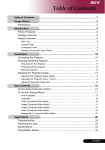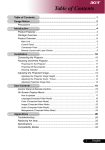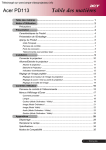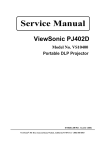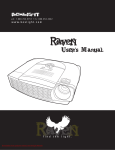Download Acer PD113P Specifications
Transcript
Table of Contents Table of Contents .................................................................................................. 1 Usage Notice ......................................................................................................... 2 Precautions ......................................................................................................... 2 Introduction ........................................................................................................... 4 Product Features ................................................................................................ 4 Package Overview ............................................................................................. 5 Product Overview ............................................................................................... 6 Main Unit .................................................................................................................. 6 Control Panel ........................................................................................................... 7 Connection Ports ..................................................................................................... 8 Remote Control with Laser Pointer ........................................................................... 9 Installation ........................................................................................................... 10 Connecting the Projector .................................................................................. 10 Powering On/Off the Projector .......................................................................... 11 Powering On the Projector ...................................................................................... 11 Powering Off the projector ...................................................................................... 12 Warning Indicator ..................................................................................................... 12 Adjusting the Projected Image ......................................................................... 13 Adjusting the Projector Image Height ...................................................................... 13 Adjusting the Projector Zoom / Focus .................................................................... 14 Adjusting Projected Image Size ............................................................................... 14 User Controls....................................................................................................... 15 Control Panel & Remote Control ..................................................................... 15 On-Screen Display Menus ............................................................................... 17 How to operate ........................................................................................................ 17 Language ................................................................................................................. 18 Color (Computer/Video Mode) ................................................................................. 19 Image (Computer Mode) .......................................................................................... 21 Image (Video Mode).................................................................................................. 22 Audio (Computer/Video Mode) ................................................................................. 23 Management (Computer/Video Mode) ..................................................................... 24 Appendices .......................................................................................................... 28 Troubleshooting ............................................................................................... 28 Replacing the lamp .......................................................................................... 32 Specifications ................................................................................................... 34 Compatibility Modes ........................................................................................ 35 1 ... English Usage Notice Precautions Follow all warnings, precautions and maintenance as recommended in this user’s guide to maximize the life of your unit. English...2 Warning- Do not look into the projector’s lens when the lamp is on. The bright light may hurt your eyes. Warning- To reduce the risk of fire or electric shock, do not expose this product to rain or moisture. Warning- Please do not open or disassemble the product as this may cause electric shock. Warning- When changing the lamp, please allow unit to cool down, and follow all changing instructions. Warning- This product will detect the life of the lamp itself. Please be sure to change the lamp when it shows warning messages. Warning- Reset the “Lamp Hour Reset” function from the On Screen Display “Management” menu after replacing the lamp module (refer to page 25). Warning- When switching the projector off, please ensure the projector completes its cooling cycle before disconnecting power. Warning- Turn on the projector first and then the signal sources. Warning- Do not use lens cap when projector is in operation. Warning- When the lamp reaches the end of its life, it will burn out and may make a loud popping sound. If this happens, the projector will not turn back on until the lamp module has been replaced. To replace the lamp, follow the procedures listed under “Replacing the Lamp”. Usage Notice Do: Turn off the product before cleaning. Use a soft cloth moistened with mild detergent to clean the display housing. Disconnect the power plug from AC outlet if the product is not being used for a long period of time. Don’t: Block the slots and openings on the unit provided for ventilation. Use abrasive cleaners, waxes or solvents to clean the unit. Use under the following conditions: - In extremely hot, cold or humid environments. - In areas susceptible to excessive dust and dirt. - Near any appliance that generates a strong magnetic field. - Place in direct sunlight. 3 ... English Introduction Product Features This product is an SVGA single chip 0.55” DLPTM projector. Outstanding features include: True SVGA, 800 x 600 addressable pixels Single chip DLPTM technology NTSC/PAL/SECAM and HDTV compatible (480i/p, 576i/p, 720p, 1080i) Full function remote control with laser pointer User friendly multilingual on screen display menu Advanced digital keystone correction and high quality full screen image re-scaling User friendly control panel SXGA+, SXGA compression and VGA, SVGA re-sizing Mac compatible English...4 Introduction Package Overview This projector comes with all the items shown below. Check to make sure your unit is complete. Contact your dealer immediately if anything is missing. Projector with lens cap Power Cord Composite Video Cable S-Video Cable 2 x Battery User’s Guide VGA to Component / HDTV USB Cable VGA Cable Audio Cable Remote Control with Laser Pointer Carrying Case Quick Start Card 5 ... English Introduction Product Overview Main Unit 1 2 3 4 9 5 8 6 7 1. 2. 3. 4. 5. 6. 7. 8. 9. English...6 Control Panel Zoom Ring Focus Ring Zoom Lens Elevator Button Elevator Foot Connection Ports Power Socket Remote Control Receiver Introduction Control Panel 1 2 3 4 7 1. 2. 3. 4. 5. 6. 7. 6 5 Menu Temp Indicator LED Lamp Indicator LED Source Re-Sync Power and Indicator LED (Power LED) Four Directional Select Keys 7 ... English Introduction Connection Ports 1 2 3 4 5 6 1. 2. 3. 4. 5. 6. English...8 USB Connector Audio Input Connector PC Analog Signal/HDTV/Component Video Input Connector S-Video Input Connector Composite Video Input Connector Power Socket Introduction Remote Control with Laser Pointer 1 2 16 3 15 4 14 13 5 12 6 7 1. 2. 3. 4. 5. 6. 7. 8. 11 8 10 9 Laser Pointer Transmit Indicator Light Empowering Key Menu Page Up Page Down Keystone Source 9. 10. 11. 12. 13. 14. 15. 16. Freeze Hide Re-Sync Mute Laser Button Keystone + Four Directional Select Keys Power 9 ... English Installation Connecting the Projector 1 USB RGB S-Video Output 3 2 4 6 5 7 DVD Player, Settop Box, HDTV receiver Video Output 1.............................................................................................. Power Cord 2. ..................................................................................................... USB Cable 3. ............................................................................................ Audio Cable 4. .................................................................................................... VGA Cable 5. ............................................................................................... S-Video Cable 6................................................................. VGA to Component / HDTV 7. .............................................................................. Composite Video Cable To ensure the projector works well with your computer, please set the display mode of your graphic card less than or equal to 800 x 600 resolution. Make sure the timing of the display mode is compatible with the projector. Refer to the “Compatibility Modes” section on page 35. English...10 Installation Powering On/Off the Projector Powering On the Projector 1. Remove the lens cap. 2. Ensure that the power cord and signal cable are securely connected. The Power LED will flash blue. 3. Turn on the lamp by pressing “ ” button on the control panel. And the Power LED will turn steady blue. 4. Turn on your source (computer, notebook, video player ,etc.). The projector will detect your source automatically. 1 the screen displays “Searching”, please make sure the signal cables are securely connected. If you connect multiple sources at the same time, using the “Source” button on the remote control or control panel to switch. 1 Power NOTE Turn on the projector first and then the signal sources. 11 ... English Installation Powering Off the Projector 1. Press the “ ” button to turn off the projector lamp, you will see a message “Please press power button again to complete the shutdown process. Warning: DO NOT unplug while the projector fan is still running.” displayed on the projector’s screen. Press the “ ” button again to confirm, otherwise the message will disappear after 5 seconds. 2. The cooling fans continue to operate for about 60 seconds for cooling cycle and the Power LED will keep blue. When the Power LED begins flashing, the projector has entered standby mode. If you wish to turn the projector back on, you must wait until the projector has completed the cooling cycle and has entered standby mode. Once in standby mode, simply press “ ” button to restart the projector. 3. Disconnect the power cord from the electrical outlet and the projector. 4. Do not turn on the projector immediately following a power off procedure. Warning Indicator When the “LAMP” indicator lights solid red, the projector will automatically shut itself down. Please contact your local reseller or service center. When the “TEMP” indicator lights solid red for about 20 seconds, it indicates the projector has been overheated. The projector will automatically shut itself down. Under normal conditions, the projector can be switched on again after it has cooled down. If the problem persists, you should contact your local dealer or our service center. When the “TEMP” indicator solid red for about 10 seconds, Please contact your local dealer or our service center. English...12 Installation Adjusting the Projected Image Adjusting the Projector Image Height The projector is equipped with an elevator foot for adjusting the image height. To raise the image: 1. Press the elevator button 1 . 2. Raise the image to the desired height angle 2 , then release the button to lock the elevator foot into position. To lower the image: 1. Press the elevator button. 2. Lower the image, then release the button to lock the elevator foot into position. 1 Elevator Button 2 Elevator Foot 13 ... English Installation Adjusting the Projector Zoom / Focus You may turn the zoom ring to zoom in or out. To focus the image, rotate the focus ring until the image is clear. The projector will focus at distances from 3.9 to 32.8 feet (1.2 to 10.0 meters). Zoom Ring Focus Ring Adjusting Projection Image Size 275.00 220.00 192.50 137.5 229.17 183.33 82.50 160.42 33.00 114.58 68.75 27.50 3.94'(1.2m) 9.84'(3.0m) 16.40'(5.0m) 22.97'(7.0m) 26.25'(8.0m) 32.81'(10.0m) PROJECTION DISTANCE 1.2 1.5 2 2.2 3 4 5 6 7 8 9 10 12 (METER) 4 : 3 SCREEN Wide 33.00 41.25 55.00 60.50 82.50 110.00 137.50 165.00 192.50 220.00 247.50 275.00 330.00 SIZE - DIAGONAL (INCH) Tele 27.50 34.38 45.83 50.42 68.75 91.67 114.58 137.50 160.42 183.33 206.25 229.17 275.00 This graph is for user’s reference only. English...14 User Controls Control Panel & Remote Control There are two ways for you to control the functions: Remote Control and Control Panel. Control Panel Remote Control Using the Control Panel Refer to the “Power On/Off the Projector” section on pages 11-12. Source Press “Source” to choose RGB, Component-p, Component-i, S-Video, Composite Video and HDTV sources. Menu Press “Menu” to launch the on screen display (OSD) menu. To exit OSD, press “Menu” again. Four Directional Select Keys Use to select items or make adjustments to your selection. 15 ... English User Controls Using the Remote Control Power Refer to the “Power On/Off the Projector” section on pages 11-12. Empowering Key Display the “Display Mode” submenu of the onscreen display menu to select display mode from PC, Movie, sRGB and User directly. Menu Press “Menu” to launch the on screen display menu. To exit OSD, press “Menu” again. Four Directional Select Keys Use to select items or make adjustments to your selection. Laser Button Aim the remote at the viewing screen, press and hold this button to activate the laser pointer. Mute Momentarily turns off the audio. Keystone + / Adjusts image distortion caused by tilting the projector ( 15 degrees). Page Up (Computer mode only) Use this button to page up. This function is only available when the projector is connected to a computer via an USB cable. Page Down (Computer mode only) Use this button to page down. This function is only available when the projector is connected to a computer via an USB cable. Re-Sync Automatically synchronizes the projector to the input source. Hide Momentarily turns off the video. Press “Hide” to hide image, press again to restore display of the image. Source Press “Source” to choose RGB, Component-p, Component-i, S-Video, Composite Video and HDTV sources. Freeze Press “Freeze” to pause the screen image. English...16 User Controls On-Screen Display Menus The Projector has multilingual On Screen Display menus that allow you to make image adjustments and change a variety of settings. The projector will automatically detect the source. How to operate 1. To open the OSD menu, press “Menu” on the Remote Control or press “Menu”on the Control Panel. 2. When OSD is displayed, use keys to select any item in the main menu. After selecting the desired main menu item, press to enter sub menu for feature setting. 3. Use by keys to select the desired item and adjust the settings key. 4. Select the next item to be adjusted in the sub menu and adjust as described above. 5. Press “Menu” on the Remote Control or press “Menu”on the Control Panel, the screen will return to the main menu. 6. To exit OSD, press “Menu” on the Remote Control or press “Menu ”on the Control Panel again. The OSD menu will close and the projector will automatically save the new settings. Main Menu Sub Menu Sub Menu 17 ... English User Controls Language Language Choose the multilingual OSD menu . Use the or key to select your prefered language. Press “Menu” on the Remote Control or press “Menu”on the Control Panel to finalize the selection. English...18 User Controls Color (Computer / Video Mode) Display Mode There are many factory presets optimized for various types of images. PC : For computer or notebook. Movie : For home theater. sRGB : For PC standard color. User : Memorize user’s settings. Brightness Adjust the brightness of the image. Press the to darken image. Press the to lighten the image. Contrast The contrast controls the degree of difference between the lightest and darkest parts of the picture. Adjusting the contrast changes the amount of black and white in the image. Press the to decrease the contrast. Press the to increase the contrast. Color Temp. Adjust the color temperature. At higher temperature, the screen looks colder; at lower temperature, the screen looks warmer. White Segment Use the white Segment control to set the white peaking level of DMD 19 ... English User Controls Color (Computer / Video Mode) chip. 0 stands for minimal segment, and 10 stands for maximum segment. If you prefer a stronger image, adjust towards the maximum setting. For a smooth and more natural image, adjust towards the minimum setting. Degamma Effects the represent of dark scenery. With greater gamma value, dark scenery will look brighter. Saturation Adjusts a video image from black and white to fully saturated color. Press the to decrease the amount of color in the image. Press the to increase the amount of color in the image. Tint NOTE ”Saturation” and“Tint” functions are not supported under computer mode. Adjusts the color balance of red and green. Press the to increase the amount of green in the image. Press the to increase the amount of red in the image. Color R Adjusts the red color. Color G Adjusts the green color. Color B Adjusts the blue color. English...20 User Controls Image (Computer Mode) Keystone Adjust image distortion caused by tilting projection. ( 15 degrees) Aspect Ratio Use this function to choose your desired aspect ratio. 4:3 : The input source will be scaled to fit the projection screen. 16:9 : The input source will be scaled to fit the width of the screen. Auto : Keep the image with original width-higth ratio and maximize the image to fit native horizontal or vertical pixels. 16:9 Image Postion Press the to choose the image position showed on top, center, or bottom. H.Position (Horizontal Position) Press the Press the to move the image left. to move the image right. Press the Press the to move the image down. to move the image up. V. Position (Vertical Position) Frequency “Frequency”changes the display data frequency to match the frequency of your computer’s graphic card. If you experience a vertical flickering bar, use this function to make an adjustment. Tracking “Tracking” synchronizes the signal timing of the display with the graphic card. If you experience an unstable or flickering image, use this function to correct it. 21 ... English User Controls Image (Video Mode) Keystone Adjust image distortion caused by tilting projection. ( 15 degrees) Aspect Ratio Use this function to choose your desired aspect ratio. 4:3 : The input source will be scaled to fit the projection screen. 16:9 : The input source will be scaled to fit the width of the screen. Auto : Keep the image with original width-higth ratio and maximize the image to fit nativer horizontal or vertical pixels. 16:9 Image Postion Press the to choose the image position showed on top, center, or bottom. Sharpness Adjusts the sharpness of the image. English...22 Press the to decrease the sharpness. Press the to increase the sharpness. User Controls Audio (Computer / Video Mode) Volume Press the to decrease the volume. Press the to increase the volume. Mute Choose the “On” to turn mute on. Choose the “Off” to turn mute off. 23 ... English User Controls Management (Computer / Video Mode) ECO Mode Choose “On” to dim the projector lamp which will lower power consumption, extend the lamp life and reduce noise. Choose “Off” to return normal mode. Menu Location Choose the Menu location on the display screen. Projection Front-Desktop The factory default setting. Rear-Desktop When you select this function, the projector reverses the image so you can project behind a translucent screen. Front-Ceiling When you select this function, the projector turns the image upside down for ceiling-mounted projection. Rear-Ceiling When you select this function, the projector reverses and turns the image upside down at same time. You can project from behind a translucent screen with ceiling mounted projection. English...24 User Controls Management (Computer / Video Mode) Source Lock When source lock is turned off, the projector will search for other signals if the current input signal is lost. When source lock is turned on, it will “Lock” the current source channel before you press “Source” button on remote control for next channel. Lamp Hour Elapse Displays Hour the lamp’s elapsed operating time (in hours). Lamp Hour Reset Press the button and then choose “Yes“ to turn the lamp hour counter to 0 hours. Lamp Reminding Choose this function to show or to hide warning message when the changing lamp message is displayed. The message will show up 30 hours before end of life. OSD Transparency Adjusts the OSD’s transparency. 25 ... English User Controls Management (Computer / Video Mode) Start-up Screen Use this function to select your desired start-up screen. If you change the setting from one to another, when you exit the OSD menu, the new setting will take effect immediately. Acer: The default start-up screen of Acer projector. User: The user customized start-up screen, which is downloaded from PC to projector via the USB cable and My Start-up Screen utility (refer to the description of below section). My Start-up Screen English...26 User Controls Management (Computer / Video Mode) Acer My Start-up Screen is a PC utility for user to change the default start-up screen of Acer projector to their desired image. You can install My Start-up Screen from the bundled CD. Connect the projector to your PC with the bundled USB cable then execute My Start-up Screen utility to download your desired image from your PC to projector. Before the download starts, the projector must enter “Download Mode” first. Please follow the instruction below to enter “Download Mode”. 1. If the AC power cord of the projector was unplugged, plug the AC power. 2. If the projector was turned on, press power button twice to turn off the projector. 3. Make sure all the fan of projector was shut down and the "Power" LED is blinking. 4. Press and hold "Menu/Enter" button then press " " button. 5. When "Temp" and "Lamp" LEDs turn on again, release both buttons, projector enters download mode. 6. Please make sure the USB cable has been plugged and connected to your projector. Reset Press the button and then choose “Yes” to return the display parameters on all menus to the factory default settings. 27 ... English Appendices Troubleshooting If you experience trouble with the projector, refer to the following information. If the problem persists, please contact your local reseller or service center. Problem: No image appears on screen. Ensure all the cables and power connections are correctly and securely connected as described in the “Installation” section. Ensure the pins of connectors are not crooked or broken. Check if the projection lamp has been securely installed. Please refer to the “Replacing the lamp” section. Make sure you have removed the lens cap and the projector is switched on. Ensure that the “Hide” feature is not enabled. Problem: Partial, scrolling or incorrectly displayed image. Press the “Re-Sync” button on the Remote Control. If you use a PC: If the resolution of your computer is higher than 800 x 600. Follow the steps outlined below to reset the resolution. For Windows 3.x: 1. In the Windows Program Manager, click the “Windows Setup” icon in the Main group. 2. Verify that your display resolution setting is less than or equal to 800 x 600. For Windows 95,98,2000,XP: 1. Open “My Computer” icon, the “Control Panel” folder, and then double click on the “Display” icon. 2. Select the “Setting” tab. 3. In the “Desktop Area” you will find the resolution setting. Verify that the resolution setting is less than or equal to 800 x 600 resolution. If the projector is still not projecting the whole image, you will also need to change the monitor display you are using. Refer to the following steps. English...28 Appendices 4. Follow the above steps 1-2. Click on the “Advanced Properties” button. 5. Select the “Change” button under the “Monitor” tab . than or equal to 800 x 600. 6. Click on “Show all devices”. Then select “Standard monitor types” under the “Manufacturers” box ; choose the resolution mode you need under the “Models” box. 7. Verify that the resolution setting of the monitor display is less than or equal to 800 x 600. If you are using a Notebook PC: 1. You are required to implement the above steps of resolution setting of the computer first. 2. Switch the Notebook PC display to the “external display only” or “CRT only” mode. If you experience difficulty in changing resolutions or your monitor freezes, restart all the equipment and the projector. Problem: The screen of the Notebook or PowerBook computer is not displaying your presentation. If you are using a Notebook PC: Some Notebook PCs may deactivate their screens when a second display device is in use. Refer to your computer’s documentation for information on how to reactivate the monitor display. If you are using an Apple PowerBook: In Control Panels, open the PowerBook Display to select Video Mirroring “On”. Problem: Image is unstable or flickering Use “Tracking” to correct it. Refer to page 21. Change the monitor color setting from your computer. Problem: Image has vertical flickering bar Use “Frequency” to make an adjustment. Refer to page 21. Check and reconfigure the display mode of your graphic card to make it compatible with the product. Refer to page 21. Problem: Image is out of focus Adjusts the Focus Ring on the projector lens. Refer to page 14. Make sure the projection screen is between the required distance 3.9 to 32.8 feet (1.2 to 10.0 meters) from the projector. 29 ... English Appendices Problem: The image is outstretched when displaying 16:9 DVD. The projector automatically detects 16:9 DVD and adjusts the aspect ratio by digitizing to full screen with 4:3 default setting. If the image is still outstretched, you will also need to adjust the aspect ratio by referring to the following: Please select 4:3 aspect ratio type on your DVD player if you are playing a 16:9 DVD. If you can’t select 4:3 aspect ratio type on your DVD player, please select 4:3 aspect ratio on screen menu. Problem: Image is reversed. Select “Management” from the OSD and adjust the projection direction. See page 24. Problem: Lamp burns out or makes a popping sound When the lamp reaches its end of life, it will burn out and may make a loud popping sound. If this happens, the projector will not turn on until the lamp module has been replaced. To replace the lamp, follow the procedures in the “Replacing the Lamp”. See page 32. Problem: LED lighting message Message Standby State (Input power cord) Power LED Blue Temp LED Flashing Lamp lighting Power on Power off (Cooling) Error (Lamp fail) Flashing Error (Thermal fail) Error (Fan lock fail) Flashing Error (Over Temp.) Flashing Error (Lamp Breakdown) =>Light On English...30 Flashing Flashing =>Light Off Lamp LED Appendices Problem: Message Reminders ”Lamp is approaching the end of its useful life in full power operation. Replacement Suggested!” will be shown about 10 seconds when lamp life is going to deplete. 31 ... English Appendices Replacing the lamp The projector will detect the lamp life itself. It will show you a warning message “Lamp is approaching the end of its useful life in full power operation. Replacement Suggested!” When you see this message, changing the lamp as soon as possible. Make sure the projector has been cooled down for at least 30 minutes before changing the lamp. Do not operate the lamp longer than rated lifetime. Otherwise it could be high possibility of lamp shattering. A compulsive putting-out-lights function should operate by the projector side so that the lamp after a life is not used after that for a long time. We recommend attachment of a timer etc., and attachment of a lamp exchange display function to a projector lighting time management of a lamp. (Recommendation of a regular shutdown). NOTE Warning: Lamp compartment is hot! Allow it to cool down before changing lamp! 1 2 English...32 3 4 Appendices NOTE Warning: To reduce the risk of personal injury, do not drop the lamp module or touch the lamp bulb. The bulb may shatter and cause injury if it is dropped. Lamp Changing Procedure: 1. Turn the power off the projector by pressing the button. 2. Allow the projector to cool down at least 30 minutes. 3. Disconnect the power cord. 4. Use a screwdriver to remove the screw from the cover. 1 5. Push up and remove the cover. 2 6. Remove the 2 screws from the lamp module. 3 7. Pull out the lamp module. 4 To replace the lamp module, reverse the previous steps. 33 ... English Appendices Specifications The specs specified below are subject to change without notice. Regarding the final specs, please refer to Acer accounced marketing specs. Light Valve Lamp Number of Pixels Displayable Color Brightness Contrast Ratio Uniformity Noise Level Projection Lens - Single Chip DLPTM Technology by Texas Instruments - 200W User Replaceable Lamp - 800 pixels(H) X 600 lines(V) - 16.7M colors - 1600 ANSI Lumens - 2000:1 (Full on/off) (Min) - 90% - 30 dB(A) (standard mode)/27 dB(A) (ECO mode) - F2.5 (wide), F2.7 (tele), f=20.2~24.2mm with 1.2x Manual zoom lens Projection Screen Size (Diag.) - 27.5 ~ 330 inches Diagonal Projection Distance - 3.9 to 32.8 feet (1.2 to 10.0 meters) Video Compatibility - NTSC/PAL/SECAM and HDTV compatible - Composite video & S-Video capability H. Frequency - 31kHz ~79kHz horizontal scan V. Frequency - 50Hz ~85Hz vertical refresh Power Supply - Universal AC input 100-240V ; Input Frequency 50/60Hz I/O Connectors - Power: AC power input socket - VGA Input: One 15-pin D-sub for VGA, component and HDTV signal - Video Input: One Composite video RCA input One S-Video input - USB:One USB connector for remote computer control - Audio Input: One phone jack for audio input Weight - 2.0 KG (<4.5 lb) Dimensions (W x D x H) - 256 x 198 x 92 mm Environmental - Operating Temperature: 41~95oF (5~ 35oC) Humidity: 80% maximum (Non-condensing) - Storage Temperature: -4~140oF (-20~60oC) Humidity: 80% maximum (Non-condensing) Safety Regulation - FCC Class B, CE Class B, VCCI-II, UL, cUL, TUV-GS, C-tick, PSB, PSE, CB Report, CCC English...34 Appendices Compatibility Modes Mode NOTE Note : “*” means compressed. Resolution Vertical Frequency (Hz) Horizontal Frequency (kHz) 60 Hz 72 Hz 75 Hz 85 Hz 56 Hz 60 Hz 31.5 kHz 37.7 kHz 37.5 kHz 43.3 kHz 35.1 kHz 37.9 kHz 72 Hz 75 Hz 85 Hz 60 Hz 70 Hz 75 Hz 80 Hz 85 Hz 48.1 kHz 46.9 kHz 53.7 kHz 48.4 kHz 56.5 kHz 60.0 kHz 64.0 kHz 68.3 kHz VGA 640 x 480 SVGA 800 x 600 XGA* 1024 x 768 SXGA * 1280 x 1024 60 Hz 64.0 kHz 640x480 66.66 Hz 34.98 kHz 640x480 66.68 Hz 35 kHz 832x624 74.55 Hz 49.725 kHz MAC LC 13" MAC II 13" MAC 16" MAC 19" MAC MAC G4 i Mac DV i Mac DV i Mac DV 1024x768 75 Hz 60.24 kHz 1152x870 75.06 Hz 68.68 kHz 31.35 kHz 640x480 60 Hz 1024x768 75 Hz 60 kHz 1152x870 75 Hz 68.49 kHz 1280x960 75 Hz 75 kHz 35 ... English




































